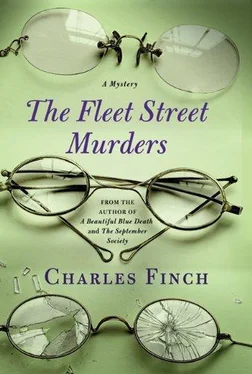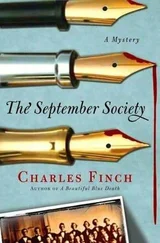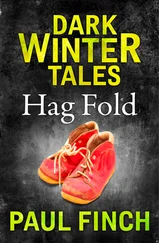Charles Finch - Fleet Street murders
Здесь есть возможность читать онлайн «Charles Finch - Fleet Street murders» весь текст электронной книги совершенно бесплатно (целиком полную версию без сокращений). В некоторых случаях можно слушать аудио, скачать через торрент в формате fb2 и присутствует краткое содержание. Жанр: Исторический детектив, на английском языке. Описание произведения, (предисловие) а так же отзывы посетителей доступны на портале библиотеки ЛибКат.
- Название:Fleet Street murders
- Автор:
- Жанр:
- Год:неизвестен
- ISBN:нет данных
- Рейтинг книги:5 / 5. Голосов: 1
-
Избранное:Добавить в избранное
- Отзывы:
-
Ваша оценка:
- 100
- 1
- 2
- 3
- 4
- 5
Fleet Street murders: краткое содержание, описание и аннотация
Предлагаем к чтению аннотацию, описание, краткое содержание или предисловие (зависит от того, что написал сам автор книги «Fleet Street murders»). Если вы не нашли необходимую информацию о книге — напишите в комментариях, мы постараемся отыскать её.
Fleet Street murders — читать онлайн бесплатно полную книгу (весь текст) целиком
Ниже представлен текст книги, разбитый по страницам. Система сохранения места последней прочитанной страницы, позволяет с удобством читать онлайн бесплатно книгу «Fleet Street murders», без необходимости каждый раз заново искать на чём Вы остановились. Поставьте закладку, и сможете в любой момент перейти на страницу, на которой закончили чтение.
Интервал:
Закладка:
He was also, Lenox felt with complete certainty, the most dangerous man in London.
For many years his feelings toward Barnard had been neutral. Lenox had gone to the man’s parties and suppers and met him in society. Two years before, that had changed.
It was a famous case, which Lenox had been proud to solve. One of Barnard’s maids had been killed, and while Barnard was innocent of that crime-his two nephews had committed the murder-in the course of his investigation Lenox had discovered something shocking: Barnard had stolen nearly twenty thousand pounds of the Mint’s money for himself. Once he knew this, Lenox began to trace a whole host of crimes back to Barnard, carefully taking notes on the unsolved mysteries in Scotland Yard’s files and developing a dossier on them.
It was personal, too, Lenox’s pursuit of Barnard, for two reasons. First, he had sent his thugs (he worked with an East End group called the Hammer Gang, who provided him with muscle) to beat half the life out of Lenox; second, and more irrationally, Barnard had proposed marriage to Lady Jane. Ever since she had rejected him and taken Lenox, Barnard had been scornful of Lady Jane, which was more than Lenox could take.
In all this time, though, he had been careful to keep his hatred of the man to himself, to greet Barnard with cordiality, never to let on what he knew.
“George, how do you do?” he said, shaking hands.
“Not badly, Lenox, not badly. There, thanks,” he said, handing a footman his overcoat. “A lovely party with a lovely hostess, isn’t it? How is Jane?”
Lenox didn’t like the sneer on Barnard’s face. “Very well, thank you.”
“Good, excellent. I admire her greatly, you know, for looking past your… profession. Or would you call it a hobby?”
“How are your days occupied now, Barnard?” asked Lenox, in a tone that even he recognized was barely civil.
Barnard wouldn’t let go of the subject. “Fine, fine,” he said, “but you-are you looking into these murders at the newspapers? It’s a great shame about, what are they called, Win Carruthers and Simon Pierce.”
“Did you know them?”
“Oh, no, of course not. Vulgar chaps, no doubt, but we mustn’t allow anarchy. Are you looking into it?”
“I’m running for Parliament soon, actually. Everything has fallen behind that priority in my life, I’m afraid.”
Barnard looked bilious at this and only said in response, “Ah-I see Terence Flood, I must speak to him.”
“Good evening,” said Lenox with a nod.
Lady Jane came back to Lenox. “Are you almost ready to leave?” she asked.
“Lord, yes,” he said.
They returned to Lenox’s house after circulating to say good-bye. Though he was troubled both by Exeter’s visit and by seeing Barnard, Lenox threw off his cares long enough to have a late snack-milk and cake-with his betrothed, and an hour’s conversation with her put him in a better mood. Walking back up her stoop, she permitted him a short kiss before going inside with a cheerful laugh. Well, he thought; all will be well in the end. This time next year perhaps I’ll be in Parliament.
CHAPTER FOUR
The next morning, Lenox was scheduled to visit his friend Thomas McConnell, a doctor who often helped on Lenox’s cases, and McConnell’s wife, Toto, a young, vivacious woman, with an endearingly cheerful way about her; the most scurrilous gossip, on her lips, seemed little more than innocent chatter. She was a beauty, too, and had married the handsome, athletic Scot though she was some twelve years his junior.
Yet their marriage had been troubled-had even at times seemed doomed-and while Toto’s personality had remained essentially the same throughout the couple’s troubles, his had not. Once bluff and hale, an outdoorsman with gentle manners, he had begun to drink, and his face now, though still handsome, had a sallow, sunken look to it.
However, things had for a year or so been better, more loving, and it appeared that now the couple had passed the rocky shoals of their first years and settled into a contented marriage on both sides, with more maturity and tenderness, more selflessness, after all of their early turmoil. The apotheosis of this newfound happiness was a pregnancy: In six months Toto would give birth. It had been to check on her that Lenox was going to visit the McConnells’ vast house.
When he woke, however, Lenox received a note from McConnell begging his pardon and asking him to delay his visit until he was bidden come. Lenox didn’t like the tone of the note, and visiting Lady Jane for his lunch, asked her about it.
“I haven’t the faintest idea,” she said, worried. “Shall I visit Toto?”
“Perhaps, yes,” said Lenox.
She had stopped eating her soup. “Despite his request?”
“You and Toto are awfully close, Jane.”
“Yes, that’s true.”
“Will you tell me what happens?”
“Of course.”
After she finished eating, she called for her carriage and in time went to her relation’s house. Lenox was in the midst of a biography of Hadrian and sat back with his pipe to read it. He was an amateur historian and, without a case, devoted at least a few hours of each day to study of the Romans. His monographs on daily life in Augustan Rome had been well received at the great universities, and he had a wide, international correspondence with other scholars. That day, however, all his thoughts had been on Pierce and Carruthers.
Jane returned sometime later, looking ashen. “It’s bad news,” she said.
“What?” he asked.
“Toto fell ill in the middle of the night.”
“Good God,” he said, sitting by her on his red leather couch.
“They called the doctor in just past midnight. Thomas is worried to the point of utter exhaustion and blames himself for poor-what did he say?-poor medical supervision of his wife.”
“She has a dozen doctors.”
“So I told him.”
“Is it-” He could scarcely ask. “Have they lost the baby?”
A tear rolled down Lady Jane’s cheek. “It seems they may have. The doctors can’t say yet. There’s-there’s blood.”
With that she collapsed onto his shoulder and wept. He held her tight.
“Is she in danger?”
“They won’t say, but Thomas doesn’t think so.”
It was an anxiety-filled early evening. After Lady Jane had returned with her news, Lenox had written to McConnell offering any help he could give, down to the smallest errand. Now Lenox and Lady Jane waited, talking very little. At some point a light supper appeared before them, but neither ate. Twice Lenox sent a maid to McConnell’s house to inquire, and both times she came back without any new information.
At last, close to ten o’clock, McConnell himself appeared. He looked drawn and weary, his strong and healthy body somehow obscene.
“A glass of wine,” Lenox told Graham.
“Or whisky, better still, with a splash of water,” McConnell said miserably. He buried his head in his hands after Lenox led him to the sofa.
“Right away, sir,” said Graham and returned with it.
McConnell drank off half the glass before he spoke again. “We lost the child,” he said at last. “Toto will be well, however.”
“Damn it,” said Lenox. “I’m so sorry, Thomas.”
Lady Jane was pale. “I must go see her,” she said.
Lenox thought of all Toto’s long, prattling monologues about baby names and baby toys, about painting rooms blue or pink, about what schools a boy child would attend or what year a girl would come out in society. Lenox and Jane were to have stood godparents. He thought of that, too.
“She didn’t want to see anything of me. May you do better,” said McConnell.
Lady Jane left.
Читать дальшеИнтервал:
Закладка:
Похожие книги на «Fleet Street murders»
Представляем Вашему вниманию похожие книги на «Fleet Street murders» списком для выбора. Мы отобрали схожую по названию и смыслу литературу в надежде предоставить читателям больше вариантов отыскать новые, интересные, ещё непрочитанные произведения.
Обсуждение, отзывы о книге «Fleet Street murders» и просто собственные мнения читателей. Оставьте ваши комментарии, напишите, что Вы думаете о произведении, его смысле или главных героях. Укажите что конкретно понравилось, а что нет, и почему Вы так считаете.












